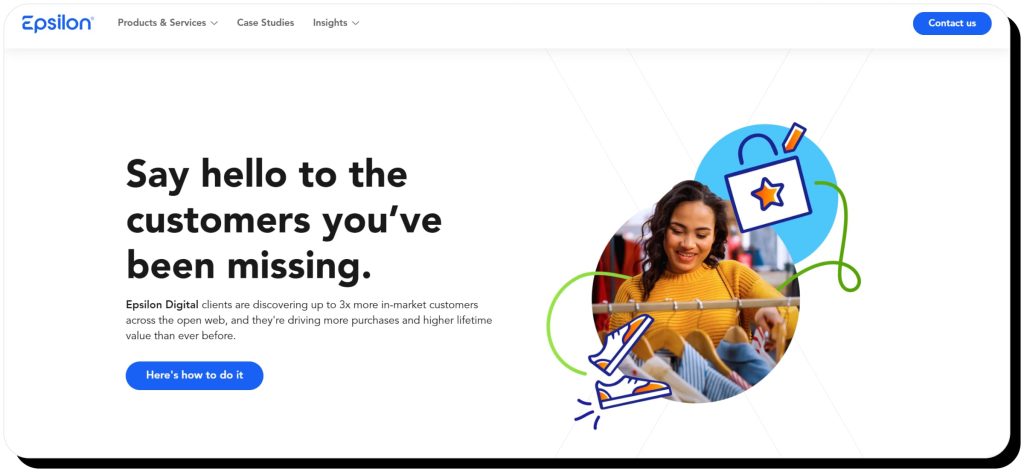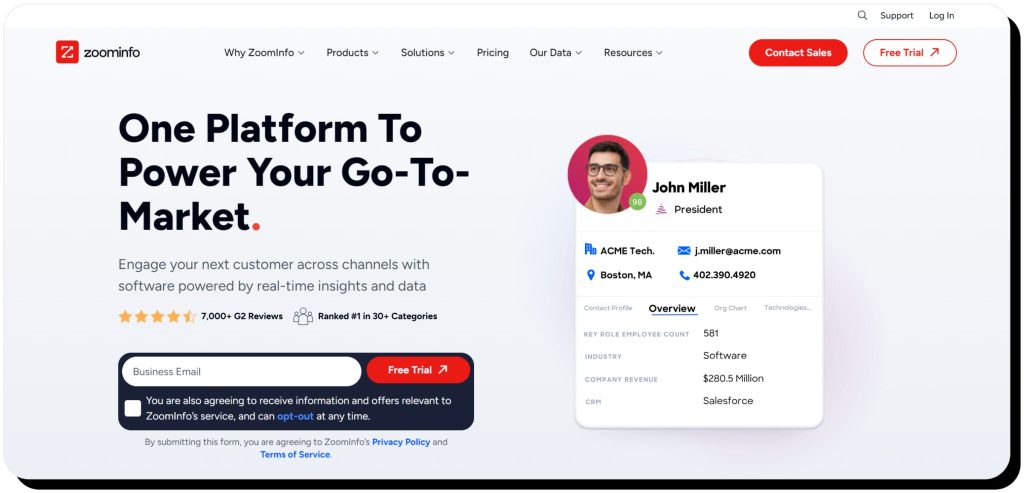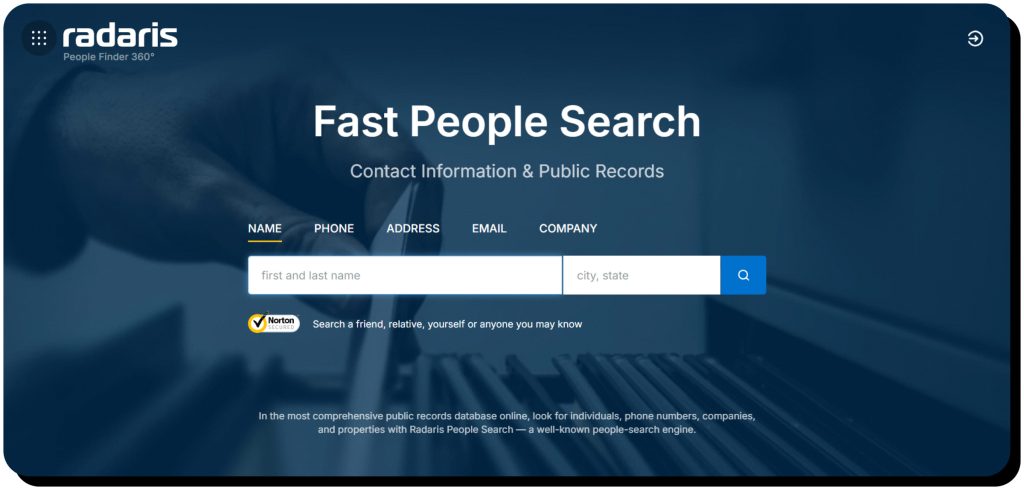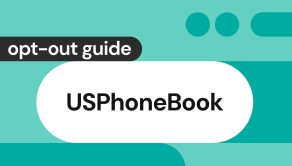Top five largest data brokers in America: the hidden impact on privacy and security

Information is the digital age’s most valuable commodity, fueling a massive $200 billion data broker industry that collects, organizes, and sells your personal details. Some data brokers license information to companies for identity verification, fraud prevention, and targeted advertising. Others share your sensitive information with anyone willing to pay for it – even criminals and scammers. Keep reading to discover the largest data brokers in America, how they affect you, and how you can opt out of having your data shared.
Which companies are the biggest data brokers?
There are various types of data brokers and determining the largest depends on which metrics you’re measuring. For example, you can base your evaluation on which data brokers have the largest consumer databases or which have the most pages indexed in Google and earn the most traffic.
Major data brokers
Major data brokers primarily operate B2B models – they’re companies that sell data exclusively to other businesses, so the average person can’t use them to research someone else. However, major data brokers provide data to numerous marketing databases and people-search sites, which, in turn, anyone can use to find your personal info.
Here are the largest data brokers in this category.
| Top 5 data broker companies | Consumer database | Annual revenue |
|---|---|---|
| Experian | 300+ million people | $9.7 billion |
| Equifax | 220+ million people | $5.1 billion |
| Epsilon | 250+ million people | $2.9 billion |
| Acxiom | 260+ million people | $2.7 billion |
| CoreLogic | 134 million addresses | $1 billion |
Experian
Experian is a major data brokerage and credit bureau with $9.7 billion in annual revenue and 21,700 employees worldwide. Serving a wide range of industries from advertising, automotive, and financial/fintech to healthcare, mortgage, and the public sector, Experian provides data for targeted marketing, credit profiling, fraud and risk management, and debt collections.
The company’s ConsumerView U.S. database includes thousands of data points on more than 300 million American citizens and 126 million households to lend insights into demographics, consumer behavior, personal interests, consumer credit information, and lifestyles. Its credit list features information on 245 million consumers and more than 25 million businesses.
Equifax
Equifax is one of the biggest data brokers in the U.S., earning $5.1 billion in annual revenue and employing more than 14,000 people worldwide. Equifax collects personal and financial data for targeted advertising, consumer credit reporting, fraud prevention, and income and employment verification.
A major credit reporting agency, Equifax serves various industries including automotive, communications, utilities, banking and finance, gaming, government, healthcare, insurance, retail, mortgage, and manufacturing. The information broker houses credit data for more than 220 million U.S. consumers and 33 million businesses, plus has over 800 online audience segments for targeted marketing.
Epsilon

Epsilon claims to have data on every marketable U.S. household with records on 250 million U.S. consumers. The company provides information for various industries, including retail, restaurants, travel, healthcare, financial, insurance, automotive, telecom, and nonprofits; and it sells data to major corporations such as McDonald’s, Valvoline, Walgreens, and Marriott.
With a focus on targeted marketing, Epsilon states it has names and “vital consumer data” on nearly every consumer in the United States. The data broker collects thousands of data points on U.S. consumers, including demographic data, health and wellness history, spending habits and purchase intent, and income and auto ownership. Epsilon Data Management LLC has 9,000 employees and earns $2.9 billion in annual revenue.
Acxiom
Acxiom is one of the largest data brokers in the U.S., boasting $2.7 billion in annual revenue and more than 4,000 employees worldwide. The company specializes in consumer intelligence and has a U.S. consumer database featuring demographic, behavioral, financial, health, and interest data points on 260 million individuals and 190 million households.
Many of the top banks, automotive companies, hotel companies, insurance providers, retailers, and telecom and media companies use Acxiom for marketing data and identity verification, including Chase Bank, Unilever, Discover, Office Depot, and Southwest.
CoreLogic

CoreLogic specializes in property and location intelligence, with databases that include over 99% of all U.S. properties. The company primarily serves the real estate, mortgage, and insurance industries – all related to the housing market – and provides marketing, lead generation, and customer retention services through its list of more than 134 million addresses that cover 94% of U.S. homeowners.
One of the largest data brokers in America, CoreLogic boasts annual revenue of $1 billion and employs more than 4,800 people worldwide.
Largest data brokers based on traffic and number of pages indexed by Google
Unlike major data brokers that serve the B2B market, numerous other large brokers package data into personal background reports and make them openly available online which poses significant security risks to individuals.
Often referred to as people-search sites, these companies thrive on web traffic, so they give more and more information away for free in an attempt to outrank one another on Google. The highest-ranking sites get the most traffic and earn the most revenue by selling more detailed background reports – exposing your data to the largest number of people and leaving you vulnerable to identity theft, stalking, financial fraud, and other crimes.
Here are the largest data brokers by number of pages indexed per Google and monthly traffic per Similarweb.
| List of data broker companies | Number of indexed pages | Monthly visits |
|---|---|---|
| Yellowpages | 18.2 million | 15.2 million |
| ZoomInfo | 8.29 million | 7.2 million |
| Spokeo | 4.2 million | 13.5 million |
| Radaris | 4.72 million | 9.4 million |
| FastPeopleSearch | 4.11 million | 11.2 million |
Yellowpages
Yellowpages.com has 18.2 million pages indexed in Google and earns 15.2 million visits a month, making it one of the largest data brokers in the U.S. The site is a business directory that allows you to search for companies by name, type, and location.
Though it’s primarily a directory for business information, Yellowpages.com also has a white pages feature that provides personal details such as contact information, relationships, court and criminal records, financial records, mortgage and vehicle information, social media profiles, relatives, and more.
ZoomInfo

Zoominfo is one of the biggest data brokers with 8.29 million indexed pages and 7.2 million monthly visitors. It’s used by sales and marketing teams as well as recruiters and potential clients to gain intel on companies, their employees, and talent for hiring.
Zoominfo reveals company contact details, annual revenue, organizational charts, and other information. The site also displays individual employee email addresses, phone numbers, work experience, colleagues, education, memberships, and affiliations.
Spokeo
Spokeo is a people-search site that makes it easy to find almost anyone by name, email, phone number, or address. From there, you can discover their contact information, location history, social media profiles, demographic data, income information, and relatives.
The site has 4.2 million pages indexed in Google, earns 13.5 million visitors each month, and boasts 6 billion consumer records, 600 million court records, and 130 million property records.
Radaris

With 4.72 million indexed pages and 9.4 million monthly visitors, Radaris is one of the biggest data brokers in America. The site has 183 million unique names with more than 594 million records in its searchable database, which reveals information such as contact details, family members, colleagues, marriage and divorce records, photos and videos (including mugshots), and social media accounts.
Radaris also allows anyone to sign up to receive notifications anytime there’s a mention of another person online. In addition to individual records, the company provides data on 63 million businesses.
FastPeopleSearch
As its name implies, FastPeopleSearch is a people-search website that makes it easy to find detailed personal information when you search by name, phone number, or address. You can also share your location to get intel on people near you.
With a database of 800 million unique people and 16.5 billion records, FastPeopleSearch is one of the nation’s biggest data brokers. It has 4.11 million pages indexed in Google and earns 11.2 million visits each month.
How data brokers affect you
Data brokers represent significant privacy risks – so much so that four U.S. states have enacted data broker laws (however, there are no overarching federal data broker laws like GDPR in the European Union).
Data broker activities can influence what advertisements, company offers, and content you see online. They track your demographics, interests, and behavior and provide this information to marketers to serve ads you’re likely to engage with.
While some might consider data collection for targeted advertising helpful, data broker sites also have a significant impact on your digital identity. Profiles on people-search sites contribute vastly to your digital footprint, making it easy for anyone to find sensitive information such as your court records, income, social media accounts, credit score range, and even your photos and videos. What’s more, these sites never verify their data resulting in false information like legal actions or bankruptcies attributed to you instead of a person with the same name.
Worse, scammers can misuse this data with criminal intent:
- They can steal your identity, make purchases in your name, or hack your online accounts
- They can impersonate a well-known company and use your personal data to convince you they’re legitimate
- An ex-partner or a hate group could even look up your address or location history to stalk and harass you
As for major brokers, even though they aren’t selling data to the general public, they are susceptible to data breaches that can put your sensitive information in the wrong hands, including your Social Security number and online account login credentials (if your information was involved in a data breach or you believe you’re a victim of identity theft, contact the Federal Trade Commission here).
How data brokers collect consumer data
Data broker companies tap various sources to collect data, including:
- Public records
- Online behaviors (tracked with browser cookies)
- Online surveys and forms
- Loyalty and rewards programs
- Websites and apps (check privacy policy pages to see what information they collect and share)
- Purchasing data from other companies, such as credit card companies
The information data brokers collect cover numerous areas of an individual’s life, from basic demographics to detailed online activities, including:
- Personal information: Name, address, email, phone number, family members, property and vehicle records, and court records
- Demographics: Age, occupation, gender, ethnicity, income and net worth, credit scores, education level, and political and religious affiliations
- Consumer information: Shopping history and consumer transactions, websites visited, search history, location information, advertisements clicked, newsletter subscriptions, and social posts
The good news is you can opt out of data brokers to protect your data privacy and prevent identity theft, financial fraud, and other crimes.
Choose to opt out of big data brokers automatically
The law requires data broker sites to remove your information on request. Each data brokerage website has its own opt-out procedure, but the process typically involves:
- Finding the opt-out page or form
- Finding your profile
- Filling out an opt-out request
- Verifying your identity via email or phone
- Revisiting the site later to confirm your profile was deleted
However, data brokers don’t make it easy to opt out. Most people don’t have the hundreds of hours it takes to remove yourself from all the websites out there – and even if you do, they’ll probably republish your data anyway, making removal a never-ending task.
Onerep helps by scanning 230 data broker sites for your information and automatically submitting opt-out requests for you. We use dummy emails and phone numbers to safeguard your contact info throughout the entire process. Then, we revisit each page to confirm removal, and we regularly rescan each site to ensure they don’t republish your information. If they do, we automatically begin the opt-out process again.
FAQ
How many data brokers are there in the US?
There are thousands of data brokers in the U.S. At the time of this writing, states with public data broker registries reported 550 (California), 404 (Vermont), and 36 (Oregon) active data brokers, though some companies are exempt from registering.
Who buys data from data brokers?
Many people and organizations buy data from data brokers. Banks and creditors buy data for credit scoring, risk mitigation, and fraud prevention. Retailers buy data for targeted marketing campaigns. Individuals look for data to find relatives and friends, research someone they don’t well, or see who’s behind unknown phone numbers. Criminals buy data to commit scams, steal identities, or locate and stalk their victims.
Is Google a data broker?
Google is not a data broker because it doesn’t directly sell your information. However, it does analyze data to construct demographic and behavioral profiles and share data with third-party advertisers who bid on targeted ad space. The information from people-search sites is indexed by Google and becomes easily accessible to the general public via the search giant.
What do data brokers know about me?
Data brokers know a great deal about you, including your demographics, interests, contact information, consumer information, shopping behaviors, location history, relatives, marital status, income and net worth, credit scores, political and religious affiliations, online activity, health status and medical conditions, court and arrest records, and much more.





Dimitri is a tech entrepreneur and founder of Onerep, the first fully automated data removal service. Top cybersecurity CEO of 2021 by The Software Report.